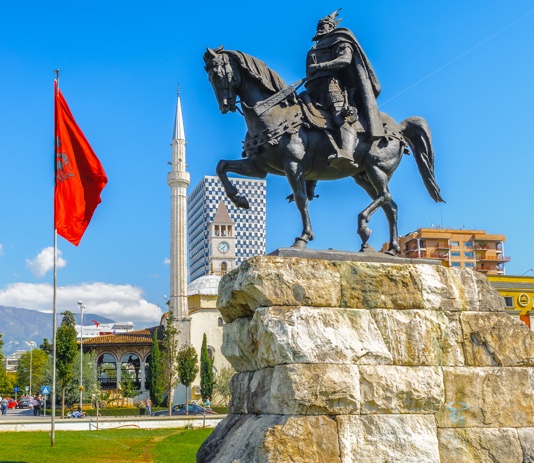by Armando Donninelli –
The Greater Albania project corresponds to the idea of unifying the territories which are predominantly inhabited by Albanian-speaking populations.
It is an idea that began to take shape precisely at the end of the 1800s. In fact, up to that moment, the Albanian-speaking elites were rather disunited, favored in this by the Ottoman Empire which, dominating those populations for 500 years, enforced rigorously and effectively Divide and rule.
In particular, the Ottomans tended to clearly favor the Albanian Muslims, about 2/3 of the total population, this to the detriment of the Albanian Catholics, approximately 10% and concentrated in the north, but also of the Orthodox Albanians, around 20% and mainly resident in the south.
The turning point was the Russo-Turkish War (1877-1878), in fact at a certain point in the conflict the possibility clearly emerged that the unitary Ottoman dominion over the Albanian territories would cease following the loss of some areas. This greatly alarmed the leaders of the various Albanian communities and, to decide what to do, they met in June 1878 in Prizren where they founded the League of Prizren which, in the future, was supposed to represent and protect them.
This body, at least originally, did not have secession as its ultimate goal. The nationalist leaders themselves realized that religious and regional differences would constitute a difficult system to manage and, consequently, sought more limited, in addition to the preservation of territorial unity, also to obtain greater administrative autonomy within the Empire Ottoman.
The rulers of Istanbul, despite the deep crisis of the Empire, strongly refused such requests and forced many leaders of Albanian nationalism into exile.
The effective independence of Albania arrived in 1913, following the Balkan Wars (1912-1913), however vast territories inhabited by Albanians and passed under the sovereignty of Greece and above all Serbia remained outside the territory of the new state.
Following the conclusion of the First World War, the territory of Albania became the object of a heavy rivalry between Italy and the Kingdom of Serbs, Croats and Slovenes, in order to gain influence over the new and weak state. Rome, also violating previous agreements with Belgrade, managed to transform Albania into its own satellite, starting from 1924. All this while the numerous Albanian native speakers residing in the Kingdom of Serbs, Croats and Slovenians were subjected to a violent campaign aimed at obtain their assimilation and to deny their cultural and religious peculiarities.
It was just after the end of the First World War that the idea of unifying all the Albanian-speaking populations was strengthened, the persecutions just mentioned contributed decisively to this.
In 1918, the Kosovo Committee was created by former fighters against the Ottomans. Its goal was to unite all Albanian-speaking populations with Albania, starting with the numerically most important population residing in Kosovo. It was a clandestine resistance movement which also had among its enemies the government of Tirana, considered too lukewarm in the face of the project of Greater Albania. Many of his leaders were killed, however he managed to demonstrate the idea of unifying the Albanians by force had gained space and consensus among the population.
In April 1941, following the defeat of Yugoslavia in the Second World War, the project of Greater Albania seemed about to be realized. In fact, at that point, the government of Tirana, in turn controlled in the form of a protectorate by Rome, gained control of almost all of Kosovo, part of North Macedonia, Serbia and Montenegro. All areas inhabited mainly by Albanians. Historians agree in stating that Mussolini supported the project of greater Albania not because he was a staunch supporter of it but, rather, because he considered it a valid instrument to ensure Italy’s control, even if indirectly, of those territories.
The heavy persecutions suffered by the Serbs residing in that period in the aforementioned territories should be remembered, characterized by numerous summary executions, expulsions and detention in prison camps.
After the capitulation of fascist Italy in September 1943, this territory came under the control of Germany which held it until the end of the conflict, at which time Albania had to return to its pre-war borders.
In the period immediately following the conclusion of the conflict, the communist government led by Hoxha cooperated with the communist government of Tito in the repression of the Albanian nationalists of Kosovo, thus reinforcing a collaboration that had been created precisely in this area during the partisan war. In the immediate post-war period Hoxha never seriously tried to achieve unification with the Albanian populations of Yugoslavia. His main objective was to consolidate the weak state structures and, for this reason, he needed Tito’s support.
In 1948 the two communist leaders, thanks above all to the role of Stalin, entered a collision course. From this moment Hoxha began to make bombastic and threatening declarations regarding the unification of the Albanian-speaking populations. These were purely propaganda statements, aimed at satisfying the Albanian public opinion, in fact the international role of Albania was so limited that there would have been no significant consequences, of which Hoxha was perfectly aware.
In the 90s of the last century, with the dissolution of Yugoslavia and the conflicts that ensued from it, the project of Greater Albania revived. Particularly in the conflict in Kosovo, first latent and then turned into an open armed confrontation, the leaders of the Kosovar guerrillas affirmed that the ultimate goal of their struggle was the creation of an ethnic Albanian state which, in addition to Albania, should also include Kosovo and the Albanian-inhabited parts of North Macedonia, Serbia and Montenegro. The Albanian public opinion, even that made up of emigrants, strongly supported this idea by providing great material and moral support to the Kosovar fighters.
The conflict ended with an agreement in 1999 under which Yugoslav forces would withdraw from Kosovo and international forces would take their place, specifically to stabilize the area and defer a decision on the status of Kosovo.
The Kosovo affair, even if it ended peacefully, had strengthened the pan-Albanian movement. Suffice it to say that shortly thereafter, the local authorities began a real guerrilla activity within the Albanian communities of North Macedonia and Serbia, for secessionist purposes to later join a large ethnic Albanian state.
Serbian government authorities, but also academics from that country, affirmed, with great force at that time, that the project to unify the Albanian populations corresponded to an Islamic project, with funding from Middle Eastern countries, aimed at establishing a large state Islamic to then expand into Europe with its precepts. This is because the majority religion among native Albanian speakers is Islam. However, solid links have never emerged between the Albanian irredentists and the Islamic fundamentalist movements, the fact remains that, especially in the future, this disturbing profile must be carefully monitored.
At the beginning of the new millennium, also thanks to the aforementioned turbulence, the project of Greater Albania was stronger than ever, not only in the Albanian communities mentioned but also in the motherland Albania. Here all the parties, without distinction, were in favor of the unification of the Albanians, the same intellectuals, with very few exceptions, strongly supported the idea. The arrival of new technologies favored its spread and take root further in public opinion.
From this moment, however, a slow decline of the centrality of this theme in the context of the political and cultural debate of the country began. This is due to the widespread awareness of the major obstacles to the realization of Albanian unity and, at the same time, the emergence of new emergencies.
The theme periodically returns to the center of the political scene in Tirana, but more to demonstrate the patriotism of the various politicians who from time to time claim to want to obtain the unity of the Albanians than with serious intentions. For example, in 2012, during the celebrations for the centenary of the birth of Albania, the then President Sali Berisha essentially stated that he wanted to implement the project of Greater Albania. But this was clearly propaganda, as demonstrated by the fact that Berisha also referred to the accession of territories once inhabited by Albanians and now under Greek control. This, as is obvious, had no consequences other than stoking controversy with neighboring countries.
The case of Kosovo is different which, having unilaterally declared its independence in 2008, finds itself in a situation of constant conflict with Serbia which, moreover, can count on the support of a substantial Serbian minority in Kosovo. To try to strengthen their position in this latent conflict, the politicians of Pristina agree in trying to obtain unification with Tirana. Even recently, the President and Prime Minister of Kosovo strongly backed this goal.
In North Macedonia, the other country in the region where a sizeable Albanian community lives and, in theory, involved in the Greater Albania project, the situation seems much calmer. Having overcome the turbulence of the beginning of the millennium, the political forces representing the Albanians have begun to collaborate in the institutional life of the country and have abandoned their secessionist intentions. In particular, the largest Albanian party, namely the Alliance for Albanians, has entered into some government coalitions together with the Social Democrats.
Many analysts agree that, in general, the Albanian-speaking politicians of the region do not seriously want to unify the Albanians, but periodically use this argument only to gain support in a context characterized by many problems, of various kinds, and by a bitter opposition between parties. The same propaganda purpose is also at the basis of the bogeyman of Greater Albania by the politicians of the surrounding countries who, by implementing the Greater Albania project, would be damaged, starting with the Serbs.
It should also be remembered that the countries interested in a possible unification of Albanian native speakers have all applied for EU membership. This accession procedure is proving to be very complicated and, among the various essential conditions set by Brussels, there is precisely the renunciation of trying to modify the borders that exist today. Some Albanian-speaking politicians have warned that if the complicated accession process fails then the Albanian peoples will reunite, but here we enter the realm of psychological pressures and not the concrete realization of a unification that today appears extremely hypothetical and difficult to realize.


